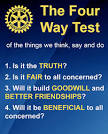
In 1931, at the height of the Great Depression,
Herbert J. Taylor was a successful, young senior executive
with the Jewel Tea Company in Chicago, Illinois.
Mr Herbert left his great position at Jewal Tea, to take over the then failing Club Aluminum. Herbert Taylor believed that if the people at Club Aluminum could “think right,” they would “do right” and he set out to find a simple guide to “right conduct” as he described, “a sort of ethical yardstick” - something everyone could apply to what they thought, said and did in their relations with others.
The bankers for Jewel Tea knew of Mr. Taylor’s skills and credentials and asked Mr. Maurice Karker, the president of Jewel Tea, if he would loan Herbert Taylor to a company that was on the brink of bankruptcy, Club Aluminum of America. Mr. Karker and Mr. Taylor both agreed to the bank’s request.
After a thorough analysis of the financial condition of Club Aluminum, Herbert Taylor provided his findings to the Creditors Committee. Club Aluminum debts exceeded its assets by $400,000. The committee agreed that the company, and its 250 jobs, could NOT be saved and should declare bankruptcy.
Mr. Taylor wrote this in his autobiography, “Maurice Karker agreed that Club Aluminum could not be saved and he asked me to return to Jewel Tea - but something strange was going on inside of me. When I compared that comfortable $33,000-a-year salary at Jewel (that’s $400,000-a-year in today’s dollars) with the almost impossible financial position of Club Aluminum, I wondered, “Is this where God really wants me to be?”
He chose to resign his secure position at Jewel and took on the seemingly impossible mission of saving the company that had almost been declared dead.
“I searched through many books for the answer,” Taylor said, “but the right phrases eluded me, so I did what I often do when I have a problem I can’t answer myself. I turn to the One with all the answers and I prayed. After a few moments of prayer, I looked up, reached for a white paper card and then wrote down the
24 words that had come to me:
Is it the TRUTH?
Is it FAIR to all concerned?
Will it build GOODWILL and BETTER FRIENDSHIPS?
Will it be BENEFICIAL to all concerned?
“I called it the Four-Way Test of the things we think, say or do,” said Taylor.
With Herbert Taylor’s Four-Way Test as a guide, Club Aluminum not only survived, it prospered. During the next 15 years, the company distributed over $1 million in stock dividends and repaid its creditors in full.
Rotary International adopted the 4-Way Test in 1942 and for the last 74 years,
it has served as an ethical yardstick for Rotarians around the world.